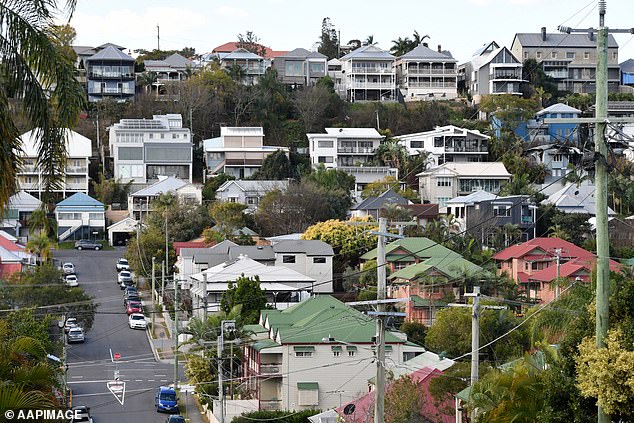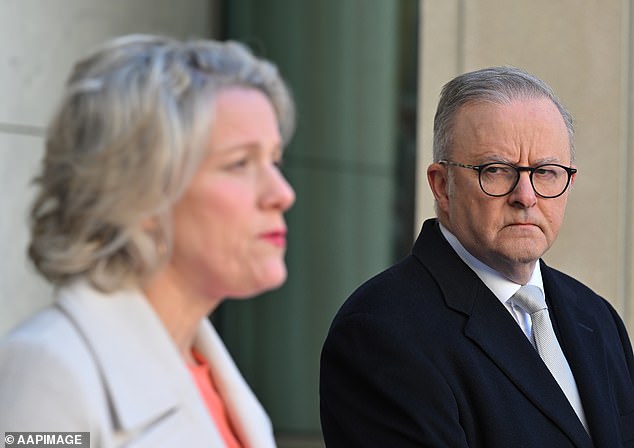A concerned father has revealed his son sees no future anywhere in Australia amid the country’s housing crisis.
The Brisbane dad explained the dire situation his son faces in a post shared to a Facebook group devoted to helping young Aussie men understand their finances.
He said his son, who is over 21 years old and works full-time as a second-year apprentice, wants to move out of home.
However, the weekly rental prices in the area amount to nearly 90 percent of his son’s wage.
‘I’m genuinely concerned for the future of this country,’ the dad wrote.
‘The most basic three-bed rental anywhere nearby is over 90 per cent of his wage. Townhouses aren’t any better.’
‘If I didn’t get a mortgage 20+ years ago, I could never afford to live in the house they were raised in.
‘Never in my life have I earned enough to qualify for the loan needed to buy my own home at today’s prices, even if I was gifted the entire original purchase price, for the deposit needed.’

He added that his son puts money into his savings each week and has also invested in shares.
Despite his savings, the dad said ‘housing is simply unaffordable’ for his son even in the outer suburbs of Brisbane.
Due to the soaring cost-of-living and the country’s worsening housing crisis, the dad said his son plans to move overseas the moment he finishes his apprenticeship.
‘He can’t see any future, anywhere in Australia,’ the dad wrote.
‘Apart from waiting for his grandparents to die (likely another 20 plus years) I can’t see him ever having any other way to even move out from his parents’ house.’
Aussies were divided over the dad’s comments, with some arguing the son’s expectations for a home were too high.
‘Why does a 21-year-old need a three-bedroom rental?,’ one person commented.
‘He needs a one bedroom apartment or studio at his age and point in his life at his income level. Or at the very least start by sharing a place,’ a second person wrote.
A third person said: ‘See this so many times where people have very unrealistic expectations early on in life without the means to support themselves.’
Others agreed with the father, with many claiming Australia’s housing market has drastically changed and is no longer viable for young Aussies.
‘Thirty years ago it wasn’t out of the ordinary for school mates parents to have holiday houses and the mum didn’t even work,’ one person wrote.
‘Pretty sad isn’t it. $100k/year used to be quite decent money 10 years ago. Now $200k/year is only just decent,’ a second person added.
‘It is what is it. Adapt and overcome. New wave of living is upon Australia,’ a third commented.
Another person claimed Australia was once the land of the ‘fair go’ but now young Aussies need to rely on intergenerational wealth to get ahead.
‘He will get a house when you die or buy it for him,’ they wrote.
‘Intergenerational wealth is the key in Australia unfortunately. The land of the “fair go” went many years ago and any life it had left was kicked out of it during and since COVID.’


House prices in Australia surged during the pandemic, in 2021, after the Reserve Bank slashed interest rates to a record-low of 0.1 per cent.
Meanwhile, prices have still soared by double-digit figures during the past year in Brisbane, Adelaide and Perth despite the Reserve Bank raising interest rates 13 times in 2022 and 2023 to a 12-year high of 4.35 per cent.
This occurred due to surging demand brought on by record-high levels of immigration.
Last year, net overseas migration climbed to record-high levels approaching 550,000, mostly to Sydney and Melbourne, which in turn pushed aspiring buyers toward more affordable cities.
An average-income earner on $100,017 buying the typical Aussie home would be unable to afford a median priced home worth $802,357.
That’s because this individual buyer would have a debt-to-income ratio of 8, which is beyond the existing bank lending threshold of 5.2 based on the existing RBA cash rate.
The situation is even more dire in capital cities which now have a median house price of $997,352.
Earlier this week, economist Leith van Onselen warned that government incentives aimed at making housing more affordable for first-time buyers, such as grants and stamp duty concessions, actually have the opposite effect, as they only bring even more buyers into the market and push prices ever higher.
Most MPs are property owners and personally benefit from rising prices, and Mr van Onselen said even those not motivated by personal gain are terrified to introduce any measure that would dampen prices for fear of losing votes.
‘Too many politicians have their snouts in the trough and know that crashing home prices is electoral poison,’ he said.
